Armored Brigade "Centauro"
The Armored Brigade "Centauro" was an armored brigade of the Italian Army. Originally raised in 1975 as 31st Armored Brigade "Curtatone" it changed its name in 1986 when the Armored Division "Centauro" was disbanded. The brigade's headquarters was in the city of Novara and most of its tank and Bersaglieri units were based in the nearby city of Bellinzago Novarese, both located in the Province of Novara. The brigades name comes from the mythological race of half human-half horse creatures named Centaurs.
| Brigata Corazzata "Centauro" | |
|---|---|
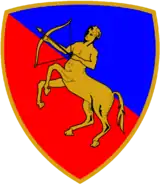 Coat of Arms of the Armored Brigade "Centauro" | |
| Active | 1 November 1986 – 5 October 2002 |
| Country | Italy |
| Branch | Italian Army |
| Role | Armored warfare |
| Part of | 3rd Army Corps |
| Garrison/HQ | Novara |
History
31st Armored Brigade "Curtatone"
The 31st Armored Brigade "Curtatone" was activated during the 1975 army reform when the regimental level was abolished and battalions came under direct command of newly formed multi-arms brigades. On 21 October 1975 the 31st Armored Brigade "Curtatone" and 3rd Mechanized Brigade "Goito" were activated by reorganizing the commands of the disbanding regiments of the Armored Division "Centauro". The Curtatone took command of the units of the 31st Tank Regiment, while the Goito took command of the units of the 3rd Bersaglieri Regiment. To bring the Curtatone to full strength it received the 9th Self-propelled Field Artillery Group "Brennero" from the 131st Armored Artillery Regiment of the Armored Division "Centauro", and the III Services Battalion "Centauro" from the "Centauro" Division's Services Grouping. Additionally an anti-tank company and an engineer company were raised for the Curtatone. The brigade's name "Curtatone" was chosen to commemorate the Battle of Curtatone and Montanara fought during the First Italian War of Independence. The brigade’s authorized strength was 3,381 men (214 Officers, 516 non-commissioned officers and 2,651 soldiers) and it was initially composed by the following units:
 31st Armored Brigade "Curtatone",[1][2][3][4] in Bellinzago Novarese
31st Armored Brigade "Curtatone",[1][2][3][4] in Bellinzago Novarese
- Command and Signal Unit "Curtatone", in Bellinzago Novarese
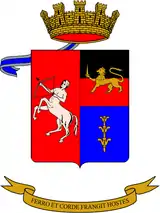 1st Tank Battalion "M.O. Cracco",[1] in Bellinzago Novarese (Leopard 1A2 main battle tanks)
1st Tank Battalion "M.O. Cracco",[1] in Bellinzago Novarese (Leopard 1A2 main battle tanks)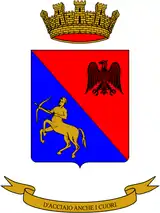 101st Tank Battalion "M.O. Zappala", in Bellinzago Novarese (Leopard 1A2 main battle tanks)
101st Tank Battalion "M.O. Zappala", in Bellinzago Novarese (Leopard 1A2 main battle tanks)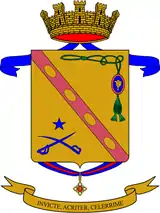 28th Bersaglieri Battalion "Oslavia", in Bellinzago Novarese
28th Bersaglieri Battalion "Oslavia", in Bellinzago Novarese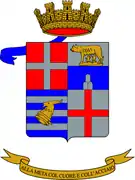 9th Self-propelled Field Artillery Group "Brennero", in Vercelli (M44 155mm self-propelled howitzers)
9th Self-propelled Field Artillery Group "Brennero", in Vercelli (M44 155mm self-propelled howitzers)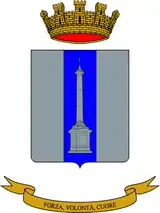 Logistic Battalion "Curtatone", in Bellinzago Novarese
Logistic Battalion "Curtatone", in Bellinzago Novarese- Anti-tank Company "Curtatone", in Bellinzago Novarese (BGM-71 TOW anti-tank guided missiles)
- Engineer Company "Curtatone", in Novara
Armored Brigade "Centauro"
On 31 October 1986 the Italian Army abolished the divisional level and brigades, that until then had been under one of the Army's four divisions, came forthwith under direct command of the Army's 3rd or 5th Army Corps. As the Armored Division "Centauro" carried a historically significant name, the division ceased to exist on 31 October in Novara, but the next day in the same location the Armored Brigade "Centauro" was activated. The new brigade took command of the units of the 31st Armored Brigade "Curtatone", whose name was stricken from the roll of active units of the Italian Army.
The brigade was part of the 3rd Army Corps based in North-Western Italy. The 3rd Army Corps was tasked with defending Lombardy and Piedmont in case the 4th Alpine Army Corps and 5th Army Corps would have failed to stop invading Warsaw Pact forces east of the Adige river. After 1986 the brigade was organized as follows:
 Armored Brigade "Centauro", in Novara
Armored Brigade "Centauro", in Novara
- Command and Signal Unit "Centauro", in Novara
 1st Tank Battalion "M.O. Cracco", in Bellinzago Novarese (Leopard 1A2 main battle tanks)
1st Tank Battalion "M.O. Cracco", in Bellinzago Novarese (Leopard 1A2 main battle tanks) 101st Tank Battalion "M.O. Zappalà", in Bellinzago Novarese (Leopard 1A2 main battle tanks)
101st Tank Battalion "M.O. Zappalà", in Bellinzago Novarese (Leopard 1A2 main battle tanks) 28th Bersaglieri Battalion "Oslavia", in Bellinzago Novarese (VCC-2 armoured personnel carriers)
28th Bersaglieri Battalion "Oslavia", in Bellinzago Novarese (VCC-2 armoured personnel carriers) 9th Self-propelled Field Artillery Group "Brennero", in Vercelli (M109 155mm self-propelled howitzers)
9th Self-propelled Field Artillery Group "Brennero", in Vercelli (M109 155mm self-propelled howitzers) Logistic Battalion "Centauro", in Bellinzago Novarese
Logistic Battalion "Centauro", in Bellinzago Novarese- Bersaglieri Anti-tank Company "Centauro", in Bellinzago Novarese
- Engineer Company "Centauro", in Novara
1990–2000
During the 1990s the brigade's structure fluctuated wildly as the Italian Army drew down its forces after the end of the Cold War. On 5 November 1990 the 11th Infantry (Recruits Training) Battalion "Casale" in Casale Monferrato joined the brigade, followed on 1 June 1991 by a medical battalion from the disbanded Mechanized Brigade "Goito". On 1 July 1991 101st Tank Battalion joined the Bersaglieri Brigade "Garibaldi" and transferred to Persano in the south of Italy. In the following year the 1st Tank Battalion was renamed 31st Tank Regiment without changing its size or composition, similarly the 9th Self-propelled Field Artillery Group became the 131st Self-propelled Field Artillery Regiment. The Anti-tank company was disbanded and the Sapper company merged into the Command and Signal Unit to form the Command and Tactical Supports Unit "Centauro".
On 9 October 1995 the 31st Tank Regiment received the war flag and name of the 4th Tank Regiment and transferred its own name and war flag to the 133rd Tank Regiment in Altamura, followed on 10 October 1995 by the 131st Self-propelled Field Artillery Regiment "Centauro", which received the war flag and name of the 52nd Self-propelled Artillery Regiment "Torino" from the disbanding Mechanized Brigade "Legnano" and transferred its own name and war flag to the 2nd Self-propelled Artillery Regiment "Potenza" in Barletta. The 31st Tank Regiment and 131st Artillery Regiment became both units of the Mechanized Brigade "Pinerolo".
During 1996 the brigade also gained the 2nd and 3rd Bersaglieri regiments from the Legnano, while the 28th Bersaglieri Battalion was disbanded. On 5 November 1996 the 21st Infantry Regiment "Cremona" in Alessandria from the disbanded Motorized Brigade "Cremona" entered the brigade. Followed by the Regiment "Nizza Cavalleria" (1st) in Pinerolo, which was transferred from the 3rd Army Corps. In 1998 the 11th Infantry (Recruits Training) Battalion "Casale" was transferred to the army's Training Brigade, thus the "Centauro" brigade entered the new millennium with the following units:
 Mechanized Brigade "Centauro", in Novara
Mechanized Brigade "Centauro", in Novara
- Command and Tactical Supports Unit "Centauro", in Novara
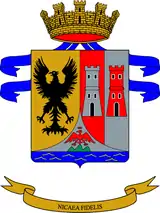 Regiment "Nizza Cavalleria" (1st), in Pinerolo (Centauro tank destroyers)
Regiment "Nizza Cavalleria" (1st), in Pinerolo (Centauro tank destroyers)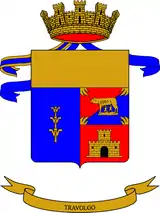 4th Tank Regiment, in Bellinzago Novarese (Ariete main battle tanks)
4th Tank Regiment, in Bellinzago Novarese (Ariete main battle tanks)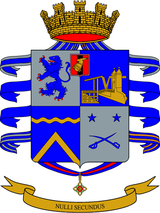 2nd Bersaglieri Regiment, in Legnano (VCC-2 armoured personnel carriers)
2nd Bersaglieri Regiment, in Legnano (VCC-2 armoured personnel carriers)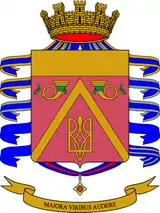 3rd Bersaglieri Regiment, in Milan (VCC-2 armoured personnel carriers)
3rd Bersaglieri Regiment, in Milan (VCC-2 armoured personnel carriers) 21st Infantry Regiment "Cremona", in Alessandria (VCC-2 armoured personnel carriers)
21st Infantry Regiment "Cremona", in Alessandria (VCC-2 armoured personnel carriers)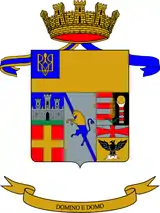 52nd Self-propelled Artillery Regiment "Torino", in Vercelli (M109L 155mm self-propelled howitzers)
52nd Self-propelled Artillery Regiment "Torino", in Vercelli (M109L 155mm self-propelled howitzers) Logistic Battalion "Centauro", in Bellinzago Novarese
Logistic Battalion "Centauro", in Bellinzago Novarese- Medical Battalion "Centauro", in Novara
2000–2002
In 2000 the Logistic Battalion and Medical Battalion were transferred to the army's newly formed Logistic Brigade. The 2nd Bersaglieri Regiment was disbanded in 2001, followed by the brigade and the 21st Infantry Regiment on 5 October 2002. The remaining units were distributed among other brigades: the Nizza Cavalleria joined the Alpine Brigade "Taurinense", the 3rd Bersaglieri and 4th Tank Regiment joined the Armored Brigade "Ariete", while the 52nd Self-propelled Artillery Regiment entered the army's Field Artillery Brigade.
See also
References
- "31° Reggimento Carri - La Storia". Esercito Italiano. Archived from the original on 29 July 2019. Retrieved 16 November 2018.
- F. dell'Uomo, R. Puletti (1998). L'Esercito Italiano verso il 2000 - Vol. Primo - Tomo I. Rome: SME - Ufficio Storico. p. 96.
- F. dell'Uomo, R. Puletti (1998). L'Esercito Italiano verso il 2000 - Vol. Primo - Tomo I. Rome: SME - Ufficio Storico. p. 211.
- F. dell'Uomo, R. di Rosa (2001). L'Esercito Italiano verso il 2000 - Vol. Secondo - Tomo I. Rome: SME - Ufficio Storico. p. 35.